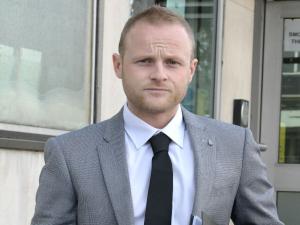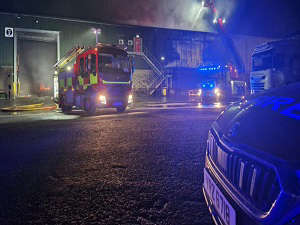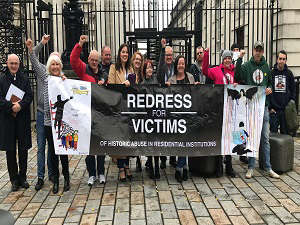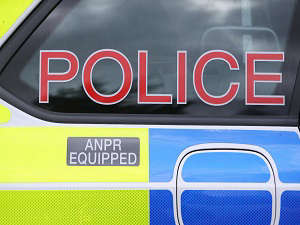
By David Young
Police who sought a warrant to search properties linked to loyalist activist Jamie Bryson were unaware he held journalistic credentials, a court has heard.
A lawyer representing the PSNI and Security Industry Authority (SIA) said they did not know the blogger was a member of the National Union of Journalists (NUJ) when they applied for warrants to raid three properties last year.
Mr Bryson has launched a legal challenge against the operation, claiming the warrants were unlawful because they were only granted by a lay magistrate, when a county court judge's approval is required if an operation is likely to uncover material subject to journalistic privilege.
The 29-year-old was arrested as part of August's operation by the PSNI and SIA into alleged breaches of private security licensing laws.
While the criminal probe continues, Mr Bryson, who denies wrongdoing, has taken judicial review proceedings against the two bodies.
He claims sensitive journalistic and business material unrelated to the investigation was taken during the searches - insisting such seizures required judicial pre-approval.
During a leave hearing in Belfast High Court on Wednesday, a barrister for the PSNI and SIA insisted they had not anticipated finding anything journalistic, because they did not know he was an accredited journalist.
Dr Tony McGleenan QC said: "They were unaware of this credentials as a journalist or affiliation with a trade union or association.
"They didn't seek journalistic material."
Mr Bryson's barrister, Ronan Lavery QC, said the police used the wrong legislative provisions to obtain warrants.
He said the applications should have been scrutinised by a county court judge, suggesting the process of securing approval from a lay magistrate was "stream lined" and "less challenging".
He suggested it was untenable that investigators who had been looking into Mr Bryson's case for a year were unaware he was a journalist.
The lawyer questioned the authorities' use of a "draconian" approach of raiding the properties, when he contended his client had made clear his willingness to voluntarily co-operate with the investigation in correspondence with the SIA in the weeks before.
Mr Bryson, a political commentator who edits a website called Unionist Voice, is a temporary freelance member of the NUJ.
He claims police seized journalist material linked the Kingsmill massacre, Nama's sale of its Northern Ireland portfolio, the 1989 IRA murders of two senior RUC officers; the "On the Runs" controversy; and allegations around the exploitation of the Roma community in south Belfast.
No NUJ officials attended Wednesday's hearing. The union said while it had no input into Mr Bryson's legal or campaign strategy, it would be following the case with interest.
The court heard the SIA investigation was conducted in conjunction with the PSNI's Paramilitary Crime Taskforce - and focused on the licensing of door staff who worked at a number of bars in the North Down area.
Mr Bryson is accused of providing unlicensed door staff through a company called JJ Security Services Ltd. The court heard that the loyalist campaigner told the SIA the company - which he was listed as director - had "never traded in any shape or form".
Dr McGleenan challenged the assertion that Mr Bryson had actively co-operated with the SIA prior to the searches, claiming there were issues with his "candour".
He said the claim that JJ Security Services had never traded was undermined by documents found during a search of a bar in North Down in June last year that indicated Mr Bryson was involved in providing its door staff.
He said the decision to undertake the search and arrest operation was informed by Mr Bryson's conduct during a separate police investigation in 2013, when he went "on the run" from officers and posted videos about his whereabouts on social media.
The barrister explained that if journalistic material is seized under a warrant signed by a lay magistrate there were provisions in law to facilitate its return - namely through a screening process conducted by an independent lawyer.
Mr McGleenan claimed Mr Bryson had not engaged on a "proper basis" with that option, instead deciding to pursue a legal challenge.
Mr Lavery said his client rejected the characterisation of the 2013 incident.
He said the lay magistrate was not informed by the PSNI of Mr Bryson's offer of co-operation to the SIA, so was not given all the facts before being asked to grant warrants.
The barrister also told the judge that legislation on police documentation handed to people after their property had been searched cited legislation that does not exist.
Justice McCloskey, sitting with Justice McAlinden, did not make a final decision on whether to grant leave for a full judicial hearing on Wednesday, instead asking the lawyers to expand on some of the issues raised in further written submissions.
The case is the second before the Northern Ireland courts challenging the right of police to seize journalistic material that is apparently unconnected to the investigation they are conducting.
Police who raided the offices of two Belfast filmmakers last year with a warrant to remove material related to their documentary on a loyalist massacre also took away a tranche of papers linked to a journalistic probe into an alleged paedophile priest.
The search came as producers Trevor Birney and Barry McCaffrey were arrested over the alleged theft of a police watchdog document that appeared in their film No Stone Unturned on the murders of six men in Loughinisland, Co Down, in 1994.
The men have accused police of massively overstepping the terms of their warrant and seizing years of work they maintain should be protected by journalistic privilege.
A judicial review taken by Fine Point Films is due to be heard later this year.


 Firefighters tackle large fire at Coleraine recycling plant
Firefighters tackle large fire at Coleraine recycling plant
 Institutional abuse survivors urged to come forward before deadline passes
Institutional abuse survivors urged to come forward before deadline passes
 Motorcyclist dies in County Antrim road accicent
Motorcyclist dies in County Antrim road accicent
 ATM stolen from Co Antrim service station
ATM stolen from Co Antrim service station
 IntoMedia Group Announces Charity Partner for 2025
IntoMedia Group Announces Charity Partner for 2025